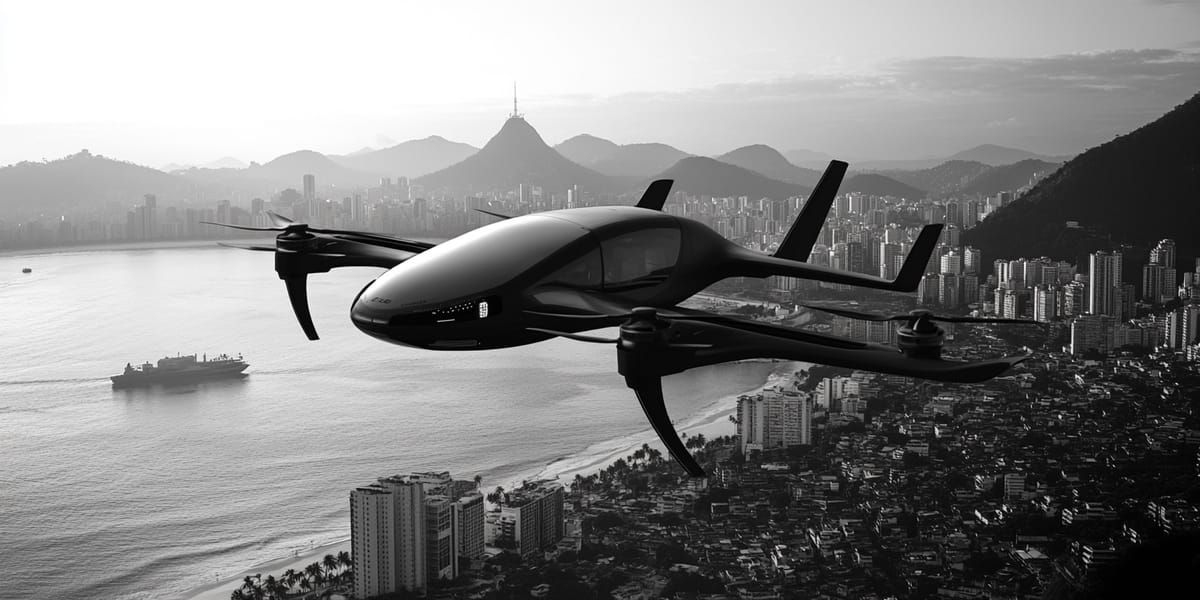Eve Air Mobility Secures $250 Million Deal for 50 Electric Aircraft with Brazilian Operator Revo

Aerotime reports that Eve Air Mobility signed a binding framework agreement with Revo for up to 50 electric vertical take-off and landing aircraft valued at $250 million. The deal, announced at the Paris Air Show on June 15, 2025, represents Eve's first binding commercial agreement and includes aircraft purchases, entry-into-service support, and aftermarket services through Eve's TechCare package.
Revo, a Brazilian urban air mobility operator and subsidiary of Omni Helicopters International, will become Eve's launch operator in São Paulo. The agreement builds on existing collaboration between the companies, including successful urban air traffic management simulations using Eve's Vector software. First deliveries are planned for the fourth quarter of 2027.
São Paulo Market Dynamics and Operational Advantages
São Paulo currently operates over 400 registered helicopters with nearly 2,000 daily takeoffs and landings, making it the world's largest helicopter market. According to Stock Titan, routes that typically require 1.5 to 3 hours by car can be completed in just 10 minutes using Eve's eVTOL aircraft.
The Eve-100 aircraft features eight dedicated propellers for vertical flight and fixed wings for cruise operations, with no position changes during flight. The design includes dual electric motors providing propulsion redundancy to ensure safety and performance. Air Data News reports that the first unmanned prototype flight is expected in early 2025, with commercial operations scheduled for 2027.
Financial Foundation and Market Position
Eve has secured substantial funding to support development and production. Eve Air Mobility announced a $35 million investment from Brazil's National Development Bank in December 2024, following previous BNDES financing totaling $88 million for manufacturing facility development. The company also received a $50 million loan from Citibank and $94 million in new equity funding during 2024.
Eve maintains the industry's largest pre-order book with letters of intent for 2,900 aircraft from 30 customers across 13 countries, representing potential revenue of $14.5 billion. The company's order backlog includes agreements with major airlines such as United Airlines and aircraft lessors. Manufacturing capacity is planned to reach 480 aircraft annually at Eve's Taubaté facility in São Paulo state.
Industry Growth and Market Implications
The urban air mobility sector is experiencing rapid expansion driven by technological advances and increasing investment. Business Aviation projects the global eVTOL market will reach $87.6 billion by 2026, growing at a 37.2% compound annual rate. Morgan Stanley estimates the total addressable market for urban air mobility could reach $1.5 trillion by 2040.
PR Newswire notes that Eve's Global Market Outlook anticipates an in-service vehicle fleet of 30,000 eVTOLs by 2045, supporting three billion passengers and generating potential revenue of $280 billion. Asia-Pacific is expected to show significant growth driven by dense megacities and rising middle-class populations.
Traditional financial institutions are showing increased interest in alternative mobility financing as urban air mobility represents a new asset class requiring specialized operational and regulatory expertise. The successful completion of binding commercial agreements like Eve's deal with Revo demonstrates the sector's progression from development to commercial execution, potentially opening new financing channels for infrastructure development and fleet operations.
Related Reading on Morrow Report
The Alternative Financial Systems Index provides comprehensive analysis of financial systems operating outside traditional banking structures. This research examines performance metrics across decentralized finance, community banking, microfinance, blockchain currencies, and peer-to-peer systems. Readers will gain insights into how alternative financial mechanisms achieve higher efficiency through reduced transaction costs, faster access times, and improved financial inclusion compared to conventional systems. The index includes quantitative data on transaction volumes, user adoption rates, and economic impact metrics that demonstrate how emerging financial technologies can support new industries like urban air mobility through innovative funding and operational models.




